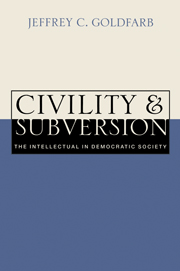Book contents
- Frontmatter
- Contents
- Acknowledgments
- 1 Introduction: the intellectuals at century's end
- 2 Who are the intellectuals?
- 3 The civil intellectual and the public
- 4 The subversive intellectual and the public
- 5 The civil society ideal
- 6 The intellectuals and the politics of culture after communism
- 7 The university
- 8 Race and discursive disruption
- 9 Race and sustained deliberation
- 10 Why is there no feminism after communism?
- 11 Civility and subversion in cynical times
- Notes
- Bibliography
- Index
3 - The civil intellectual and the public
Published online by Cambridge University Press: 06 July 2010
- Frontmatter
- Contents
- Acknowledgments
- 1 Introduction: the intellectuals at century's end
- 2 Who are the intellectuals?
- 3 The civil intellectual and the public
- 4 The subversive intellectual and the public
- 5 The civil society ideal
- 6 The intellectuals and the politics of culture after communism
- 7 The university
- 8 Race and discursive disruption
- 9 Race and sustained deliberation
- 10 Why is there no feminism after communism?
- 11 Civility and subversion in cynical times
- Notes
- Bibliography
- Index
Summary
Although it is natural for intellectuals to turn to the public, this does not come easily in modern democracies. The close interaction between the intellectual and his or her audience, as revealed in the case of Socrates, is replaced by distanced industrial and postindustrial processes: mass communications, public relations, the mass media, the cultural industry. In one sense, this is a very democratic development; mass culture includes more people in intellectual exchange. The political commentators on talk radio and television present their criticism to a much broader audience than classic intellectual writers, from Zola to Sartre, ever did. Yet, something is missing in this democratic development. While the new forms of public exchange are more democratic in that they are more inclusive, they are less democratic in that they are less participatory, less deliberative, and more manipulative. Democracy's self-rule of the people comes up short on the self and strong on the rule.
Some, such as those of the realist school of democracy, from Joseph Schumpeter to Robert Dahl, view this turn as inevitable. They understand that democracy can practically function in complex societies of the twentieth century only through a politics of elite competition and action, with the “people” taking a necessarily passive role. It is argued that the institutions of modern democracy necessarily should distance the citizenry from the actual practices of governance and policy debate. Officials are elected through free and fair elections.
- Type
- Chapter
- Information
- Civility and SubversionThe Intellectual in Democratic Society, pp. 42 - 55Publisher: Cambridge University PressPrint publication year: 1998



